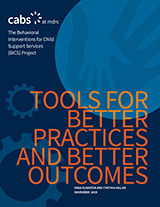Tools for Better Practices and Better Outcomes

 The federal Office of Child Support Enforcement (OCSE) created the Behavioral Interventions for Child Support Services (BICS) demonstration in 2014. The goals of the demonstration were to use insights from behavioral science to develop interventions that could improve child support services and increase parent engagement, and to encourage the rapid-cycle testing of these strategies, leading to further improvements. In the process, the project aimed to build the participating child support programs’ capabilities in behavioral science and evaluation and support these and other child support programs in replicating and implementing effective practices. Child support agencies in California, Colorado, the District of Columbia, Georgia, Ohio, Texas, Vermont, and Washington participated as grantees.
The federal Office of Child Support Enforcement (OCSE) created the Behavioral Interventions for Child Support Services (BICS) demonstration in 2014. The goals of the demonstration were to use insights from behavioral science to develop interventions that could improve child support services and increase parent engagement, and to encourage the rapid-cycle testing of these strategies, leading to further improvements. In the process, the project aimed to build the participating child support programs’ capabilities in behavioral science and evaluation and support these and other child support programs in replicating and implementing effective practices. Child support agencies in California, Colorado, the District of Columbia, Georgia, Ohio, Texas, Vermont, and Washington participated as grantees.
The project addressed several common operational challenges that may create barriers to the successful establishment, enforcement, and modification of child support orders. The child support process can be difficult for parents to navigate, for example, given the complex legal language and lengthy forms involved, and parents may perceive their interactions with child support agencies to be adversarial. The 22 interventions, tested by the grantees in two phases, used a range of design principles from behavioral science — for example, simplification, personalization, and reminders — to address these challenges. One program simplified the initial paperwork sent to the parents required to pay child support, providing clearer language and instructions on next steps. Another program held in-person meetings with parents to help them understand their payment options and make plans for ongoing payment. A third program assigned particular staff members to help parents navigate the process of requesting modifications of their child support order amounts and complete the necessary forms.
Findings from the demonstration include the following:
- Outreach and communication informed by behavioral science can make parents more likely to respond to outreach, attend in-person meetings, submit required forms, and make initial payments on new orders.
- Interventions directed at a specific activity, such as encouraging parents to attend a meeting at the child support office, can affect outcomes related to that activity, but will not necessarily affect other outcomes at later points in the child support process, such as longer-term payment rates.
- The interventions’ effects are typically modest in size, but they are also inexpensive to implement.
- Interventions informed by behavioral science do not always have the intended effects, highlighting the need to continue testing and refining practices.
The BICS project demonstrates the significant potential for behavioral science to improve child support services for parents and staff members. Each of the participating agencies has since incorporated concepts from behavioral science into ongoing program operations. In addition, the grantees, along with OCSE, are mentoring additional states and localities as they attempt to improve their services and meet their goal of securing support for children.







